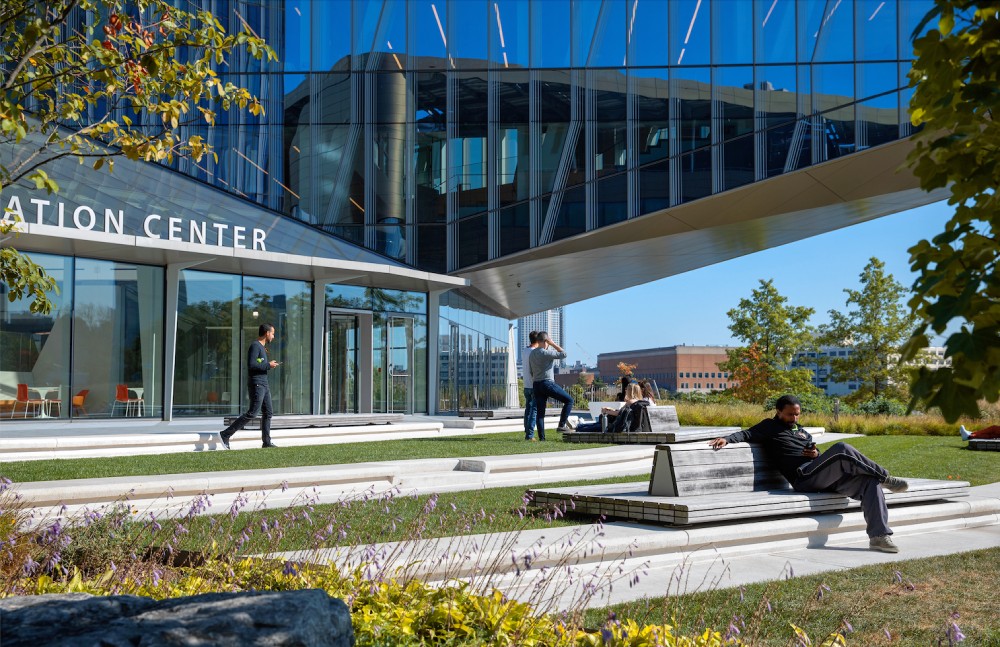
Cornell University’s SC Johnson College of Business teaches its New York-area EMBA classes in its Tata Innovation Center at the Cornell Tech Campus.
Three years and three days into one of the most disruptive decades in the history of business education, 2023 dawns with yet more turbulence ahead. Predictions range from an economic downturn at best to a full-on recession at worst. Hiring freezes and layoffs that rocked the tech industry throughout 2022 show no sign of slowing. And if the coronavirus pandemic demonstrated anything it’s that online business education isn’t only viable, its convenience and flexibility is actually preferred by a growing number of working professionals.
Business schools are responding to the changing tides. Several traditional MBA programs are making direct overtures to tech workers, while others are reaching out to professionals facing job uncertainty. A slew of EMBA programs have launched new hybrid and online programs to entice busy executives (see UMN Carlson and Emory Goizueta).
This week, in our ongoing EMBA Spotlight series, we dive into one program that seems to be uniquely situated for this particular set of circumstances: Cornell University’s SC Johnson College of Business.
CORNELL JOHNSON EMBA SPOTLIGHT
One of the biggest distinguishing features of Cornell’s EMBA right now is its expertise in remote learning. Long before Zoom became part of the business school lexicon – and six years even before the platform’s launch – Cornell Johnson was innovating distance learning to reach executives in cities across North and South America.
Cornell’s EMBA Americas pioneered the concept of distributed classrooms with remote instruction all the way back in 2005. With its partner, Queens University in Canada, it opened remote classrooms in 20 cities in the U.S., Canada, Mexico, Chile and Peru.
“Cornell is the only Ivy League program that uses distributed classrooms with remote instruction, allowing executives from different parts of the country—from the Bay Area to Boston and Detroit to Dallas—to study at an Ivy League university based in the Northeast,” Manoj Thomas, senior director of Cornell Johnson’s EMBA programs, tells Poets&Quants.
“It is now the gold standard in distance education.”
4 PROGRAMS ENROLLING MORE THAN 400 STUDENTS PER YEAR
Cornell also offers four distinct EMBA programs: EMBA Metro NY, Cornell EMBA Americas, EMBA/MS in Healthcare Leadership, and the Cornell-Tsinghua Dual Degree Finance MBA. You can see a comparison of the programs in the chart below.
While each caters to a specific population, all of them share Cornell’s signature pedagogical tools: Ivy League rigor, immediate applicability, team-based learning, and an emphasis on people-centered leadership for shared and sustainable prosperity.
Cornell’s is also among the largest EMBA programs, Thomas notes. At 430 students across its four programs, it had the largest incoming cohort of 2021, according to the EMBAC 2022 survey of Executive MBA programs. Its alumni base is more than 300,000 professionals across a wide range of industries.
Cornell ranked 15th in Poets&Quants’ 2022 composite EMBA ranking, climbing one spot from the year before. It also ranked 12th in U.S. News’ latest list.
Poets&Quants For Execs recently spoke with Thomas and Cornell Johnson dean Mark Nelson about Johnson’s EMBA programs and why the school may be uniquely situated to appeal to tech and other executives facing a shakier 2023. Our conversation has been edited for length and clarity.
To begin, why would you say Cornell Johnson is a good option, at this particular time, for professionals who are considering an executive MBA? Particularly in a climate of tech layoffs and hiring freezings, and in the face of a softening economy?
Mark Nelson: To start off with why get an EMBA period, what's wonderful is that you're dealing with seasoned executives who know, or at least suspect, what they don't know. They’re already hungry to get this infusion of knowledge.
Someone coming out of tech is a perfect example. They could have been an engineer that got promoted into product management, and they're realizing they don't know anything about accounting or finance or marketing or operations. While they're excellent in their individual field, they don't have this broader capability. And that holds them back within their industry and that might hold them back on finding the next position.

Mark Nelson, dean of Cornell's Johnson College of Business
So the idea of, at this time, investing in yourself and your capabilities makes a huge amount of sense. This is a time where professionals want to upskill, up-credential, and plug themselves into the incredible Cornell network, which is close to 300,000 people. It’s a remarkably powerful group of people, regardless of whether you're secure in your present position or you're looking for a different one.
Another point that I'd make is my Zoom background is looking out the window of the Tata Innovation Center on Roosevelt Island at the Cornell Tech Campus. In 2008, then Mayor Bloomberg created a competition to create a new tech campus in the heart of New York City on Roosevelt Island, and Cornell won that competition. What that meant is that we could build a campus from the ground up in the middle of New York City, and you don't often get that kind of an opportunity.
It's a stunning facility. The whole thing is tech focused, and we run a lot of our MBA programming out of the Tata Innovation Center. So if you're talking about people that are interested in tech, this is the nerve center of Cornell's Tech campus. We're positioned to help people advance or pivot, and we definitely understand tech because we just build a campus around it.
What are some of the unique features or innovations of the space that you find particularly relevant to tech professionals considering an EMBA?
Mark Nelson: The tech campus itself has a variety of different programs. It's a grad campus, so we have a Johnson Cornell Tech residential MBA program as well a whole bunch of different tech master's programs. You have a lot of people that are interacting in an ecosystem that is specifically designed to have business people colliding with tech people.
We have things like hackathons that our EMBA program gets involved with. We have faculty that are based at the Cornell Tech campus, and they're bringing that infusion and focus into the classroom.
NEXT PAGE: Cornell overtures to tech workers + Distance learning in wake of pandemic





Questions about this article? Email us or leave a comment below.